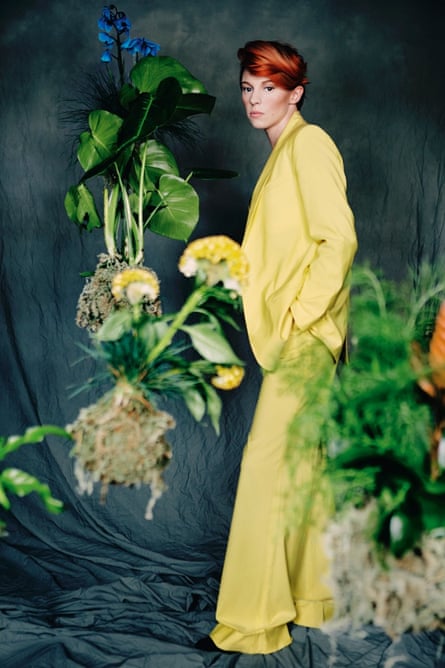"I suppose I've never really been one of those people who's quick at anything," says La Roux's Elly Jackson, sitting down for her first big interview in years and seemingly unaware of the elephant-sized understatement in the room. Not quick at anything? It's been five long years since La Roux's self-titled debut album was released, spawning killer singles "In for the Kill" and "Bulletproof" and picking up a Grammy award along the way. And during that half-decade of ominous silence many fans have been left wondering just what had become of that distinctive quiff and falsetto.
The Guardian’s product and service reviews are independent and are in no way influenced by any advertiser or commercial initiative. We will earn a commission from the retailer if you buy something through an affiliate link. Learn more.
The slow drip of news and rumour didn't sound promising: Jackson cancelled a series of shows in 2010, split with her sole songwriting partner Ben Langmaid a year later and – perhaps most worryingly of all – was believed to have scrapped her sparkly synth-pop sound for an acoustic folk direction. Even when she made a triumphant comeback appearance at 2013's Coachella festival, skipping joyously around the stage while debuting a handful of promising new songs, she swiftly followed that up by disappearing again for another year.

So what's been going on? As we'll discover over the course of a two-hour chat in her south London rehearsal space, it's not an entirely happy tale, encompassing anxiety attacks, the emotional fallout from her split with Langmaid and a terrifying period where Jackson lost her ability to sing completely. "I thought my career was over," she admits.
But at first she bats away the questions about her absence, saying she needed a creative break, she wanted to ensure everything was perfect. She can't believe it's five years either. Gosh, doesn't time fly, eh?
One listen to her new album Trouble in Paradise confirms Jackson has been working hard: a lot of time and dedication seems to have gone into the way it sounds. While still packing the same melodic punch as her debut, this record has a warmer, sexier, more groove-led feel – the result of gruelling sessions ("14 to 16 hours, six days a week, sometimes longer, for two years"). She certainly has an obsessive eye for detail. Sprawled on a chair, her trademark quiff flopped down over her face, Jackson spends large chunks of time talking about the cheekiness of a solitary bass line or analysing why a certain guitar sound on David Bowie's "Fascination" works. She even manages to answer probings into her private life with lengthy sermons about the importance of syncopation. I start to get the feeling that if I asked if it was true she locked herself in an underground bunker for five years and did nothing but smoke crystal meth, she would say: "Well, interestingly enough, we did put an added emphasis on the snare sound during the instrumental coda."
The way to Jackson's heart was always going to be through the music and so, as we start dissecting the songs themselves, that's when she opens up about her story.
We begin with "Let Me Down Gently", the emotional ballad that appeared online a few days after we spoke and swiftly sped to the top of Hype Machine's charts. "That was one of the ones Ben wasn't into," she says, revealing that it almost never saw the light of day. She also tells me that the pair were so close they would cry together during vocal takes. What happened between them? Jackson says she returned from her time away touring La Roux's first album with a head full of new musical ideas "and I felt that the artist that I'd decided to be, Ben didn't agree with."
Jackson claims Langmaid refused to consider several songs she'd written, but that they'd also drifted apart personally. "On the first record we would talk a lot and it became very emotional. One of [Langmaid's] biggest roles was [being that person] I could go and talk to about lots of very personal stuff at length and then write about. But for want of a better way of saying it, I didn't need that any more. I felt I could do that with a number of people."
One of those people was her engineer Ian Sherwin, who it seems assumed Ben's role almost immediately. "A few hours after Ben departed, we were back in the chairs working," Jackson says. "I look back on that and think it's mad. As with any split there was emotional upheaval and I should have taken some time to process that."
Does she still speak to Ben?
"No. No, I don't."
Splitting with a musical soulmate was far from the only problem on Jackson's mind. When her debut album exploded – largely off the back of Skream's dubstep remix of "In for the Kill" – Jackson admits her 21-year-old self was ill-equipped to deal with the pressures of sudden fame. The anxiety it caused is something she documents in the throbbing seven-minute electro-pop of "Silent Partner".
"It was about eight months in and there were tours appearing in front of my eyes," she says. "I felt a loss of control… and I'm a massive control freak."
Jackson began to suffer panic attacks. Then, during a gig in LA attended by her US label, she took to the stage, opened her mouth and realised that nothing was coming out. "Everyone said it wasn't that noticeable, but I don't understand how it can not have been noticeable when no sound was coming out," she smiles. Jackson cancelled shows and returned home for a break, but her singing problems wouldn't go away.
"Singing in falsetto gives you this really specific feeling. It's almost… is opiatic a word? When you reach certain high notes, that's how it feels… you really feel it between the tip of your nose and the top of your forehead, right down the centre, which is why I always close my eyes when I sing. It's like a drug. It's a zing… you feel it resonate through your skull. And to think you're not going to be able to feel that ever…"

Jackson visited a series of doctors, speech therapists, throat specialists and laryngeal massage therapists in search of a cure. "I got tested for lung cancer, throat cancer. You name it, I tried it. And I was shocked there didn't seem to be any support system for a singer on a major label who had this problem. Nobody seemed to know what to do."
Eventually she met performance anxiety specialist Andy Evans, who helped other performers whose anxiety had affected the part of their body they needed most – from a trombonists whose lips wouldn't function to a violinist who lost control of their arms. It took two years for Jackson to conquer her problem – "part of the reason why there's less falsetto on the record" – but she claims now to be a calmer, less erratic person thanks to his methods.
"And I've learnt to think before I speak," she says, aware that her voice's other problem was landing her in hot water. Whether she was caught slagging off her peers or embarking on a rant about the state of pop, Jackson's outspokenness was refreshing. But it could also be misjudged, as was the case with one notorious comment where she appeared to blame women for ending up with abusive men.
To her credit, Jackson doesn't try and justify the latter. "Arrggghhhh!" she cries, throwing her head into her hands when I bring it up. "When I see things like that I feel like I'm looking at my younger sister and going: 'Come on!' Obviously I don't still think that. I made some massive errors in judgement. I used to be so stupid. But I was young and often said things just to rile people up."
Throwaway comments aren't the only thing she cringes about now. Although Jackson is proud of her debut album's success, she finds it impossible to listen to it. "It sounds tinny, anaemic." For Trouble in Paradise she wanted a record that sounded less cheap and gnarly, and tackled subjects beyond heartbreak. She came up with a loose theme – "the feeling of emptiness in a place where there was once joy" – and began writing stories around it. The standout track "Sexoteque" is about a man ignoring his girlfriend for seedier pleasures. But it would be wrong to assume the record isn't personal at all. "Cruel Sexuality", for instance, is about "10 different subjects linked together" but with its lyric, "You make me happy in my everyday life/Why do you keep me in a prison at night?", it's fairly obvious how some people will read it.
"Of course, because people see the word 'sexuality' and think: 'Oh my God you're gay!' But sexuality just means you are a sexual person, and that song's not about me being: 'Oh no, I'm a lesbian!' or anything like that."
Jackson has frequently ducked questions regarding her sexual orientation: she says she has always liked pop stars to retain a sense of mystery, and she thinks discussing it would compromise her private life.
"I debate this a lot – do we need everyone to be 100% open about everything before we get to the stage it doesn't matter? And I agree to a point, I am aware of the conflicts. But the problem is, if I say, 'I'm straight,' nobody will come around to my house and take a picture of my boyfriend. If I say, 'I'm gay,' then somebody will come around and try to take a picture of my girlfriend."
Is that really what would happen?
"Yes. It's all very well people telling me to be open about it, but it will impact on my life. Why should I have to bear the brunt of what would happen? All I know is that if it's not something I have any interest or desire to talk about, then that needs to be my only reason."
Ultimately, Jackson says she doesn't feel comfortable with the traditional labels – gay, straight, bi – anyway. "I don't feel like I belong to any of those. So I'm not going to put myself in that camp, or under that title. I don't feel one thing or the other, I don't feel man, I don't feel woman – that's where the androgyny comes from. I probably feel more feminine than I do masculine… but if people want to hold me up as a gay role model, absolutely, I'm proud to be that, but I don't feel the need to say that I'm gay to do it."

Of course, with a new album to promote, the questions are likely to return, as will the tour commitments and spotlight on her comments. Given how troublesome she found fame last time, is she prepared for it the second time around?
"I can't really think about that," she admits. "I just need to take each day as it comes, much like an alcoholic!"
Did she even like being famous?
"Not really. I didn't get it. I still don't understand what you're supposed to do. All I can say is, everyone else seems to know how to be a famous person and I just don't. There's like these groups of famous people that hang out with each other, whereas I don't think I've got any famous friends whatsoever."
Does she feel like she missed out?
"I don't know what I'm missing out on. I don't know what they get up to, I haven't got a clue!" She sighs, and for a second sounds a lot like her forlorn younger self. "I just get the impression that people just really don't like me, so they just stay away."

Jackson doesn't get recognised too often these days ("If I go out without a quiff, it's like I'm not her"), but admits that when she does get spotted it's a relief to think "I still have a career."
It must be strange making a comeback after so long, re-entering a musical landscape that has changed so radically during your absence. When La Roux's debut album appeared, its 80s revivalism captured the zeitgeist perfectly, but how can Jackson be confident Trouble in Paradise will do the same in 2014?
The answer reveals itself when we end up on her favourite subject: music. As she raves about Tom Tom Club's "Genius of Love", or Diana Ross's classic disco album Diana, Jackson attempts to pinpoint the key ingredient she thinks is missing in today's pop.
"With those records, the slightest musical inflection can bring me to tears," she says. "I think that's a huge part of the reason why "Get Lucky" was so successful – because people were hearing a real riff being played by humans and it was arranged in a clever way. Within my generation, I'm crying out to hear something that leaves space for the music."
Spending time, allowing yourself space… these might not be valued commodities in today's frantic music scene, but they'll hopefully be what helps Trouble in Paradise stand out rather than merely fit in. And when you look at it like that, what's five years away anyway, when you're trying to make something timeless?
La Roux's Trouble in Paradise is released on 7 July






Comments (…)
Sign in or create your Guardian account to join the discussion